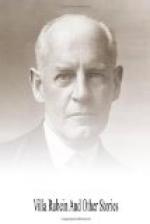“You are a little cat!” said Christian; “it isn’t true, at all. He hates shams, and can’t bear meanness; and it is mean to cover up dislikes and pretend that you agree with people.”
“Papa says that he thinks too much about himself.”
“Father!” began Christian hotly; biting her lips she stopped, and turned her wrathful eyes on Greta.
“You do not always show your dislikes, Chris.”
“I? What has that to do with it? Because one is a coward that doesn’t make it any better, does it?”
“I think that he has a great many dislikes,” murmured Greta.
“I wish you would attend to your own faults, and not pry into other people’s,” and pushing the book aside, Christian gazed in front of her.
Some minutes passed, then Greta leaning over, rubbed a cheek against her shoulder.
“I am very sorry, Chris—I only wanted to be talking. Shall I read some history?”
“Yes,” said Christian coldly.
“Are you angry with me, Chris?”
There was no answer. The lingering raindrops pattered down on the roof. Greta pulled at her sister’s sleeve.
“Look, Chris!” she said. “There is Herr Harz!”
Christian looked up, dropped her eyes again, and said: “Will you go on with the history, Greta?”
Greta sighed.
“Yes, I will—but, oh! Chris, there is the luncheon gong!” and she meekly closed the book.
During the following weeks there was a “sitting” nearly every afternoon. Miss Naylor usually attended them; the little lady was, to a certain extent, carried past objection. She had begun to take an interest in the picture, and to watch the process out of the corner of her eye; in the depths of her dear mind, however, she never quite got used to the vanity and waste of time; her lips would move and her knitting-needles click in suppressed remonstrances.
What Harz did fast he did best; if he had leisure he “saw too much,” loving his work so passionately that he could never tell exactly when to stop. He hated to lay things aside, always thinking: “I can get it better.” Greta was finished, but with Christian, try as he would, he was not satisfied; from day to day her face seemed to him to change, as if her soul were growing.
There were things too in her eyes that he could neither read nor reproduce.
Dawney would often stroll out to them after his daily visit, and lying on the grass, his arms crossed behind his head, and a big cigar between his lips, would gently banter everybody. Tea came at five o’clock, and then Mrs. Decie appeared armed with a magazine or novel, for she was proud of her literary knowledge. The sitting was suspended; Harz, with a cigarette, would move between the table and the picture, drinking his tea, putting a touch in here and there; he never sat down till it was all over for the day. During these “rests” there was talk, usually ending




